Part 1: Medium-term intentions
Nature and scope of the Auditor-General’s functions
The Controller and Auditor-General (the Auditor-General) is an Officer of Parliament who carries out her role independent of executive government and Parliament, but is accountable to Parliament for the public resources she uses to do the job.
By law, the Auditor-General is the auditor of all public entities in New Zealand - a total of about 4000 public entities, such as government departments, central agencies, Crown entities, schools, and State-owned enterprises.
All public entities are accountable for their use of public resources and powers. It is the Auditor-General’s job to give Parliament and the public independent assurance about how public entities are operating and accounting for their performance.
The role also includes auditing local authorities, which are accountable to the public for the activities they fund through locally raised revenue. As well as annual audits, the Auditor-General audits local authorities’ long-term plans, which are prepared every three years.
By carrying out audits and reporting about audit findings, the Auditor-General draws attention to matters of effectiveness and efficiency, waste, probity, and financial prudence. She recommends actions to help improve public sector performance and how performance information is reported to Parliament and the public.
The Public Audit Act 2001 sets out the mandate and responsibilities of the Auditor-General. The Auditor-General’s legislative mandate is confined to public entities, in respect of which the Auditor-General:
- must carry out the annual audit requirements of the Public Audit Act 2001 and other statutes (such as the Public Finance Act 1989 and Local Government Act 2002, which set out accountability responsibilities of public entities);
- may carry out other services of a kind that it is reasonable and appropriate for an auditor to perform; and
- may carry out performance audits and inquiries.
Strategic directions and operating intentions
The Auditor-General’s vision is to improve the performance of, and the public’s trust in, the public sector. In the medium-term, her strategy is to generate greater insight and value from our work by improving our understanding of the public entities we audit, using the full range of our resources, customising our reporting, and improving the overall capability and engagement of our staff.
We summarise our outcomes, impacts, and outputs in Figure 1. Details of the measures and standards for achieving our outcomes, and how we have performed previously are shown in Figure 2.
Figure 1
Summary of our outcomes, impacts, and outputs
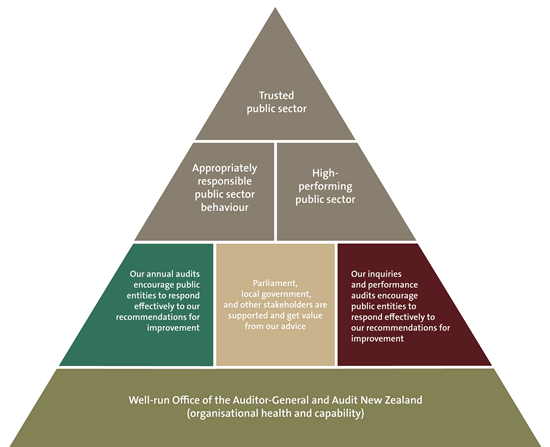

Figure 2
Measures and standards, and previous performance, for achieving our outcomes
| Measures and standards | Previous performance |
|---|---|
| Trusted public sector | 2.1 New Zealand’s score on the Transparency International Corruption Index for the six years from 2005 to 2010 |
| New Zealand's score on Transparency International's Corruption Perceptions Index is maintained or improved. | 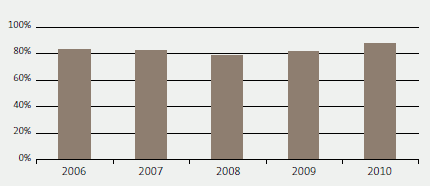 In 2010, New Zealand was rated first equal with Denmark and Singapore. New Zealand has achieved a high place on the index since it started in 1995. |
| Trusted public sector | 2.2 New Zealand’s ranking in the Worldwide Governance Indicators for the five years from 2006 to 2009 |
| New Zealand is ranked in the 90th percentile of the Worldwide Governance Indicators. | 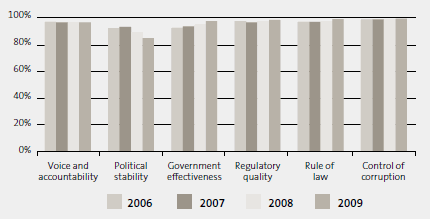 |
| Trusted public sector | 2.3 Kiwis Count Survey results in 2008 and 2010: Public servants do a good job |
| The State Services Commission’s biannual Kiwis Count Survey shows that the public’s confidence that public servants do a good job is improved (or at least maintained). | 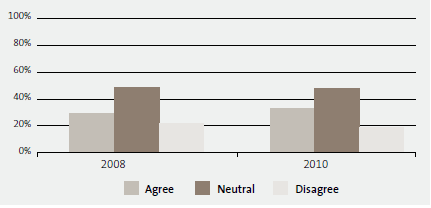 |
| Appropriately responsible public sector behaviour | 2.4 Percentage of unqualified audit opinions and audits completed on time in the five years from 2006 to 2010 |
| Public entities’ financial statements fairly reflect their actual results and are publicly available on time. | 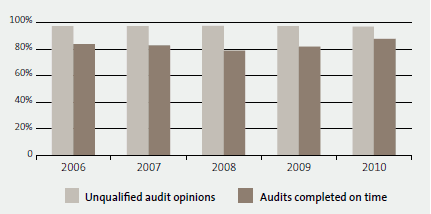 |
| Appropriately responsible public sector behaviour | 2.5 Integrity and Conduct Survey results in 2008 and 2010: State service agencies that promote their standards of integrity and conduct |
| The State Services Commission’s Integrity and Conduct Survey shows improved (or at least maintained) rates of State servants who reported that State service agencies promote their standards of integrity and conduct. | 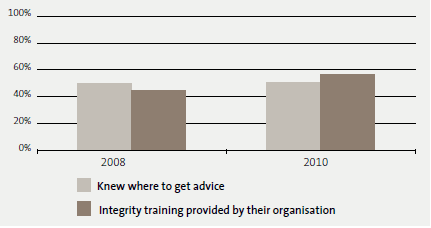 |
| Appropriately responsible public sector behaviour | 2.6 Integrity and Conduct Survey results in 2008 and 2010: State servants’ observation and reporting of misconduct |
| The State Services Commission’s Integrity and Conduct Survey shows improved (or at least maintained) rates of State servants who reported that, where they observed misconduct breaches in the past year, they reported it. | 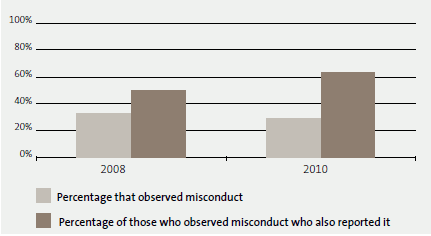 |
| High-performing public sector | 2.7 Kiwis Count Survey results in 2008 and 2010: Most recent public service experience was an example of good value for tax dollars spent |
| The State Services Commission’s biannual Kiwis Count Survey shows improved (or at least maintained) rates of respondents reporting that their most recent public service experience was an example of good value for tax dollars spent. | 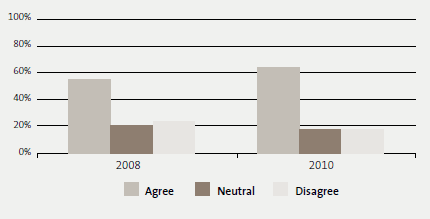 |
| High-performing public sector The State Services Commission’s biannual Kiwis Count Survey shows improved (or at least maintained) rates of public satisfaction with:
|
2.8 There were methodology changes in the Kiwis Count Survey between 2008 and 2010, which mean that the results are not directly comparable. However, the results in 2010 confirmed that the public’s satisfaction with their most recent public service experience had improved, and that the public’s experiences with public services continue to be rated better than experiences with non-government services. |
Managing in a changeable operating environment
The Auditor-General’s overview identified external factors that are influencing the Office, that are areas of focus for us to improve the assurance we provide to Parliament and the public, or that are opportunities for public sector improvement. The issues, and our responses to managing them, are:
- Auckland: The amalgamation of eight local authorities into one "super" council on 1 November 2010 was a complex exercise with major implications for the whole country, and local government in particular. We have made good progress and will build on that.
- Performance information: There are numerous challenges for the Office to implement the Auditor-General’s revised auditing standard for auditing service performance information. During the next two years, we are focusing on carrying out good quality audits of service performance information to underpin our statutory reporting duties and our efforts to add value to the organisations we audit. Our challenges include how we maintain independence and give advice, how we build confidence for this work, and how to report.
- Good analysis and reporting of sector information: We have enormous amounts of data and knowledge that we can use much better to inform our audit work and to share with others. We will focus on getting the best from what we know and improving our understanding and reporting of sector themes.
- Implementing Ministry of Economic Development and External Reporting Board changes: There is still a lot of work to do to arrive at the right set of financial reporting standards for the public sector in New Zealand. We will focus on making a positive contribution to the work of the Ministry of Economic Development and the External Reporting Board in setting and implementing appropriate standards.
- Choosing a cross-cutting theme for 2012/13: We will choose one theme for our audit effort in 2012/13 that we will report on and that will make a lasting difference to the New Zealand public sector.
- … and, of course, adding value through our 4000-plus annual audits, inquiries, and performance audits. Our auditing and assurance work is our core business, and the foundation for our ability to have a positive influence on public sector performance. We will focus on maintaining the underlying quality of all our financial and performance audits and inquiries, and on how to add value to the organisations that we audit. We will also focus on improving our reporting and our supporting communications and relationships.
Strategic risks and risk management
The Auditor-General faces four ongoing strategic risks. These risks are primarily managed through processes that support the work we do, as shown in Figure 3.
Figure 3
Our strategic risks and risk management
| Risk | Management |
|---|---|
| 1. Loss of independence – independence underpins the value of the Auditor-General's products. Losing that independence in fact or appearance, whether by failure on the part of the Auditor-General, her staff, or her appointed auditors to act independently or otherwise, would undermine trust in our organisation. | We manage this risk by applying the Auditor-General’s independence standards. The Auditor-General sets a high standard for independence for her employees and the auditors she appoints to carry out audits on her behalf. Monitoring of the independence standards, including for the two statutory officers and all employees, is carried out through a system that includes regular declarations of interest and, where necessary, implementation of measures to mitigate conflicts of interest. |
| 2. Audit failure – the risk that we issue an incorrect audit opinion with material effect, or a report that is significantly wrong in nature or process. | The Auditor-General adheres to professional auditing standards, including implementing and complying with the revised quality control standards from the New Zealand Institute of Chartered Accountants, supplemented by the Auditor-General’s auditing standards to address public sector matters where general auditing standards are not relevant or appropriate. We monitor adherence to these standards through external quality assurance regimes (such as participating in New Zealand Institute of Chartered Accountants’ practice reviews and international peer reviews from time to time). We also commission an annual independent evaluation of our audit allocation and fee-monitoring processes, an independent external review of two performance audits each year, and stakeholder feedback studies. Our internal peer review and substantiation procedures include carrying out quality assurance reviews of all our appointed auditors and our Office products on a basis of risk and at least every three years. A range of audit opinion and consistency review processes are used to confirm audit team conclusions where non-standard audit opinions are proposed, or changes to audit standards and work are being introduced. Before performance audits are presented to Parliament, a process of external report clearance and internal substantiation and review occurs. |
| 3. Loss of capability – the risk that we are unable to retain, recruit, or access people with the technical and other skills our audit work requires. | Ongoing training and development of our staff and our appointed auditors and their staff is carried out, including management programmes, leadership development initiatives, and professional development programmes. |
| 4. Loss of reputation – the risk that we lose reputation or credibility that affects our ability to maintain effective relationships with stakeholders. This could arise either because of failings in one of the three areas above or because of external expectations and perceptions about the role of the Office or its findings on any particular matter that has been the subject of audit scrutiny. The Auditor- General’s discretionary mandate is broad, and it is inevitable that we will not meet all expectations. | Managing this risk requires the exercise of judgement about where to focus our audit effort and how best to report while also achieving the greatest likelihood of public sector improvement. There are a number of ways this risk is managed in our day-to-day work. The combined leadership team of the Office meets on a regular basis to discuss issues and feedback from key stakeholders and public entities on our audit work. Senior staff liaise with public entities and key stakeholders, and we carry out regular stakeholder and client feedback surveys as well as media monitoring to identify where the Office could communicate more effectively about its role and the results of its audit work. |
